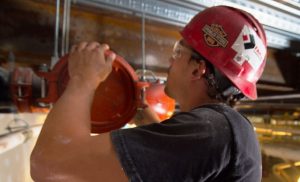One of the biggest issues with fire sprinkler systems is corrosion within the pipes. Corrosion often goes undetected until it is too late because it happens inside of the pipes and may be difficult to see until the pipes start leaking or become obstructed. The damage caused by corrosion can lead your fire sprinkler system to not work properly, which means it may not respond to a fire as it was designed to do. Fortunately, there are methods that may be used to prevent corrosion in fire sprinkler systems.
Causes of Corrosion
Understanding how corrosion occurs and what the different types of corrosion are can help prevent this problem from occurring in your sprinkler system. The most common cause of corrosion is oxidation. This happens when oxygen trapped in the sprinkler pipes dissolves in the water and reacts with the sprinkler piping. Microbiologically influenced corrosion (MIC) is a form of corrosion caused by microorganisms. MIC occurs when there are bacteria within the pipes of a fire sprinkler system along with the presence of metal, water, nutrients, and oxygen. Another type of corrosion, oxygen corrosion, occurs when oxygen gas and water in the sprinkler system react with the metal piping.
What Problems Does Corrosion Cause?
Letting corrosion go unchecked can cause serious problems with your fire sprinkler system including:
- Leaks
- Pipe obstructions
- Reduced hydraulic performance
These problems will lessen the likelihood that your sprinkler system will function properly if a fire occurs. It can also lead to expensive repair costs, damage to property and disruption to your business.
Preventing Corrosion
Taking steps to prevent corrosion in your fire sprinkler system can go a long way in lengthening the life of your system. There are several methods that can be used to prevent or manage corrosion in sprinkler systems.
In Dry Pipe Systems – Corrosion occurs in dry pipe systems when water is introduced to the pipes. It is difficult to keep the pipes in a dry system completely dry and there is usually some water present. After a dry pipe system is activated or tested, water flows through the pipes and it is a challenge to remove all of it. One way to prevent corrosion in dry pipe systems is through nitrogen interting. This process eliminates all of the oxygen within the system and replaces it with nitrogen so corrosion cannot occur.
In Wet Pipe Systems – In wet pipe systems, corrosion occurs when oxygen is introduced to the sprinkler systems. Installing an air venting device on a sprinkler system can help reduce corrosion. Wet pipe nitrogen inerting can stop corrosion in a sprinkler system by using nitrogen to displace oxygen from the piping before it is filled with water.
MIC Corrosion – There are some methods that can be used to manage MIC corrosion. This includes filling pipes with treated water to prevent bacteria growth and using biocides to treat MIC.
Preventing Corrosion with Davis-Ulmer
At Davis-Ulmer Fire Protection, our team can help you prevent corrosion in your fire sprinkler system. We can help you test your system and identify signs of corrosion to maximize the life of your sprinkler system. Our corrosion prevention services include biocide treatments and nitrogen inerting. We service locations across New York state and can help test or monitor the water within your sprinkler system to manage corrosion. If you are concerned about preventing corrosion in your sprinkler system, contact Davis-Ulmer today.

